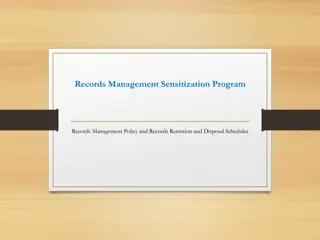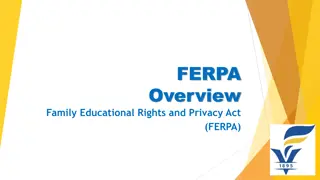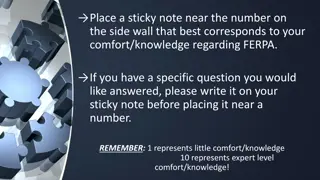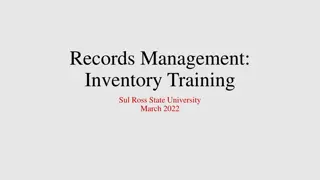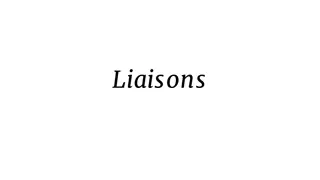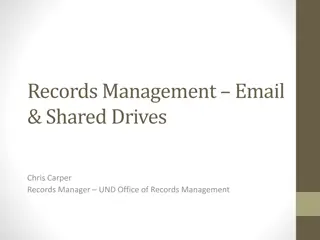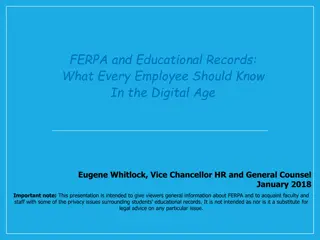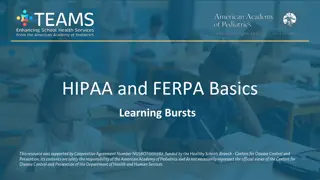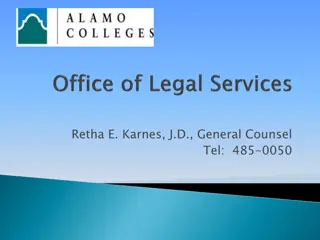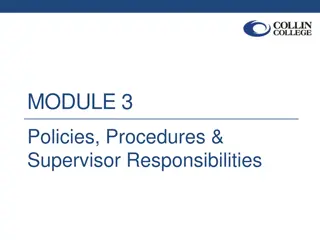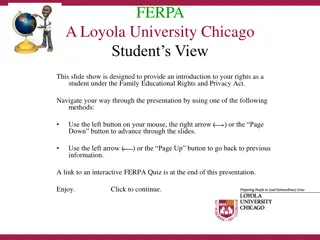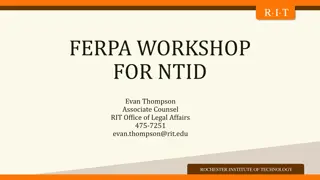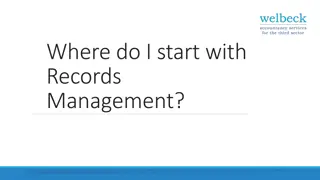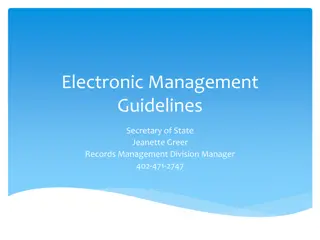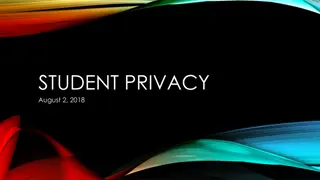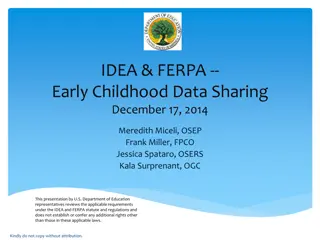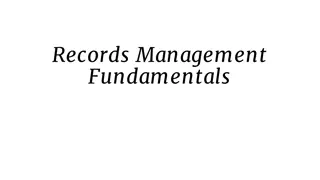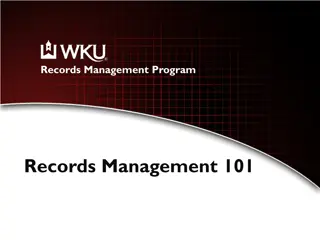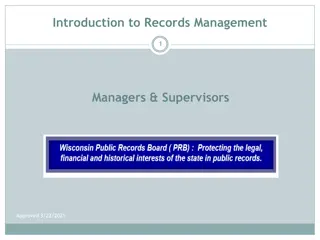Understanding Student Records: FERPA and ISSRA Guidelines
Student records are protected by laws like FERPA and ISSRA to maintain confidentiality and retention. FERPA defines education records related to students, while ISSRA encompasses all recorded information maintained by schools. Certain exclusions like law enforcement recordings apply. Understanding these regulations is crucial for handling student information appropriately.
Download Presentation

Please find below an Image/Link to download the presentation.
The content on the website is provided AS IS for your information and personal use only. It may not be sold, licensed, or shared on other websites without obtaining consent from the author. Download presentation by click this link. If you encounter any issues during the download, it is possible that the publisher has removed the file from their server.
E N D
Presentation Transcript
Student Records: An Overview and Q & A August 18, 2022 Jeremy D. Duffy, ISBE Legal Officer Equity Quality Collaboration Community 1
Agenda 1. Welcome and Introductions 2. Overview of Student Records 3. Q & A Digital vs Physical Records Permanent vs Temporary Records Retention and Destruction of Records Transfer of Records Miscellaneous Questions 2
Introduction The federal Family Educational Rights and Privacy Act (FERPA), 20 U.S.C. 1232g, and the Illinois School Student Records Act (ISSRA), 105 ILCS 10/1 et seq., protect student records in a variety of ways. The two major requirements imposed by these laws are that school districts must keep student records confidential and that school districts must retain student records.
Education Records Under FERPA FERPA defines Education Records to be information recorded in any way, including handwritten documents, electronic files, or video or audio recordings, that: Contains information directly related to a student; and Is maintained by the District. Examples of Education Records include: registration documents; grade reports; special education records; disciplinary records; and medical and health records that the school creates or collects and maintains.
School Student Records Under ISSRA School Student Records under the ISSRA means any writing or other recorded information concerning a student and by which a student may be individually identified that is maintained by the District or any employee of the District, regardless of how or where the information is stored.
School Student Records Under ISSRA School Student Records do not include: Video or other electronic recordings created and maintained by law enforcement professionals working in the school or for security or safety reasons or purposes, provided the information was created at least in part for law enforcement or security or safety reasons or purposes; and Electronic recordings made on school buses, as defined in Section 14- 3(m) of the Criminal Code of 2012 [720 ILCS 5/14-3(m)]. NOTE - a video or other electronic recording may become part of a student's school student record to the extent school officials use and maintain this content for a particular reason (e.g., disciplinary action, compliance with a student's Individualized Education Program) regarding that specific student. Any information, either written or oral, received pursuant to Section 22- 20 of the Code and Sections 1-7 and 5-905 of the Juvenile Court Act of 1987 [705 ILCS 405]
School Student Records Under ISSRA Sole Possession Records: Writings or other recorded information maintained by an employee of a school or other person at the direction of a school for his or her exclusive use; Provided that all such writings and other recorded information are destroyed not later than the student's graduation or permanent withdrawal from the school; and Provided further that no such records or recorded information may be released or disclosed to any person except a person designated by the school as a substitute unless they are first incorporated in a school student record and made subject to all of the provisions of this Act.
School Student Records Under ISSRA School Student Records under ISSRA fall into two categories: Student Permanent Record and Student Temporary Record. Student Permanent Record means the minimum personal information necessary to a school in the education of the student and contained in a school student record.
Permanent Records Permanent records consist of basic identifying information, including the student s: Basic identifying information, including the student's name and address, birth date and place, and gender, and the names and addresses of the student's parents; Evidence required under Section 5(b)(1) of the Missing Children Records Act [325 ILCS 50]; Academic transcript; Attendance record; Health record; Record of release of permanent record information in accordance with Section 6(c) of the Act; and Scores received on all State assessment tests administered at the high school level (i.e., grades 9 through 12) (see 105 ILCS 5/2-3.64a-5
Permanent Records (contd.) If not maintained in the Student Temporary Record, Permanent records may also consist of: Honors and awards received; and Information concerning participation in school-sponsored activities or athletics, or offices held in school-sponsored organizations. No other information shall be placed in the student permanent record.
Temporary Records Student Temporary Record means all information contained in a school student record but not contained in the student permanent record. Temporary records include: A record of release of temporary record information in accordance with Section 6(c) of the Act; Scores received on the State assessment tests administered in the elementary grade levels (i.e., kindergarten through grade 8) (see 105 ILCS 5/2-3.64a-5); The completed home language survey form (see 23 Ill. Adm. Code 228.15 (Identification of Eligible Students)); Information regarding serious disciplinary infractions (i.e., those involving drugs, weapons, or bodily harm to another) that resulted in expulsion, suspension, or the imposition of punishment or sanction; Information provided under Section 8.6 of the Abused and Neglected Child Reporting Act [325 ILCS 5] and information contained in service logs maintained by a local education agency under Section 14-8.02f(d) of the Code [105 ILCS 10/2(f)]; Any biometric information that is collected in accordance with Section 10-20.40 or 34-18.34 of the Code; Health-related information; and Accident Reports.
Temporary Records (contd.) Temporary records may also consist of: Family background information; Intelligence test scores, group and individual; Aptitude test scores; Reports of psychological evaluations, including information on intelligence, personality, and academic information obtained through test administration, observation, or interviews; Elementary and secondary achievement level test results; Participation in extracurricular activities, including any offices held in school-sponsored clubs or organizations; Honors and awards received; and Teacher anecdotal records.
Temporary Records (contd.) Other disciplinary information; Special education records; Records associated with plans developed under section 504 of the federal Rehabilitation Act of 1973 (29 U.S.C. 701 et seq.); and Any verified reports or information from non-educational persons, agencies, or organizations of clear relevance to the education of the student.
Directory Information Identifying information: student's name, address, grade level, and birth date and place, and parents' names, mailing addresses, electronic mail addresses, and telephone numbers. Academic awards, degrees, and honors. Information in relation to school-sponsored activities, organizations, and athletics. Major field of study. Period of attendance in the school.
Directory Information (contd.) ISSRA also states that directory information includes: Photographs, videos, or digital images used for informational or news-related purposes (whether by a media outlet or by the school) of a student participating in school or school- sponsored activities, organizations, and athletics that have appeared in school publications, such as yearbooks, newspapers, or sporting or fine arts programs, except that: No photograph highlighting individual faces shall be used for commercial purposes, including solicitation, advertising, promotion or fundraising without the prior, specific, dated and written consent of the parent or student, as applicable (see 765 ILCS 1075/30); and No image on a school security video recording shall be designated as directory information.
Directory Information (contd.) No student Social Security Number or student identification or unique student identifier can be designated as directory information. "Directory Information" may be released to the general public, unless a parent requests that any or all of the directory information not be released on his/her child. School districts shall notify parents annually of the information that is considered to be "directory information" and of the procedures to be used by parents to request that specific information not be released.
Are emails student records? Yes, they can be. E-mailthatcontains information directly related to an identifiable student, and which is maintained by a school, will qualify as a student record under FERPA and ISSRA.
STUDENT RECORDS CONFIDENTIALITY Generally, you must obtain prior specific dated written consent of the parent before student records may be released. The written consent must: Designate the person to whom the records may be released; State the reason for the release; and State the specific records to be released.
Exceptions to the Disclosure Rules Exceptions to the Parent Consent Rule: To an employee or official of the District with current demonstrable educational or administrative interest in the student, in furtherance of that interest; To the official records custodian of another school within Illinois or an official with similar responsibilities of a school outside Illinois, in which the student has enrolled, or intends to enroll, upon the request of such official or student;
Exceptions to the Rules for Disclosure (cont d.) Pursuant to a court order; For research, statistical reporting, or planning, so long as it is permissible and undertaken pursuant to the requirements of FERPA; To juvenile authorities under certain circumstances; In connection with an emergency if the knowledge of such information is necessary to protect the health or safety of the student or other persons; The following factors must be considered: 1) The seriousness of the threat to the health or safety of the student or other individuals; 2) The need for the requested records to meet the emergency; 3) Whether the individuals to whom the requested records are released are in a position to deal with the emergency; 4) The extent to which time is of the essence in dealing with the emergency. Except as otherwise required by State or federal law.
Records Requests Response Time: A parent's or student's request to inspect and copy records, or to allow a specifically designated representative to inspect and copy records, must be granted within a reasonable time, and in no case later than 10 business days after the date of receipt of such request by the official records custodian. This response time may be extended for an additional 5 business days under certain circumstances.
Make a Record of the Release of Information A record of any release of information must be made and kept as a part of the school student record. Such record of release shall be maintained for the life of the school student records and shall be available only to the parent and the official records custodian. Each record of release shall also include: (1) the nature and substance of the information released; (2) the name and signature of the official records custodian releasing such information; (3) the name of the person requesting such information, the capacity in which such a request has been made, and the purpose of such request; (4) the date of the release; and (5) a copy of any consent to such release.
Student Records Retention Permanent Records Each school shall maintain student permanent records and the information contained therein for not less than 60 years after the student has transferred, graduated, or otherwise permanently withdrawn from the school. Temporary Records Each school shall maintain student temporary records and the information contained in those records for not less than 5 years after the student has transferred, graduated, or otherwise withdrawn from the school.
Destruction of Records Destruction of Records Upon graduation, transfer, or permanent withdrawal of a student from a school, the school shall notify the parents and the student of the destruction schedule for the student permanent record and the student temporary record and of the right to request a copy of the student's records at any time prior to their destruction. Notification shall consist of the following: date of notification, name of parent, name of official records custodian, name of student, and the scheduled destruction date of temporary and permanent records. Destruction is also subject to the Local Records Act and you must consult with the Local Records Commission before records are destroyed
Digital vs Physical Records Q: What differences, if any, are there between requirements for digital and physical records? Short Answer: Few differences. The records are subject to FERPA, ISSRA, and the Local Records Act regardless of the media or format the data is maintained in or on. 26
Digital vs Physical Records Q: Is it ok to digitize physical records and then destroy the original physical record? Short Answer: Yes. Send a records disposal certificate to the Local Records Commission listing all the records to be disposed of, with an additional signature certifying that the records have been digitized and will be maintained until their retention period is up. You must consult with the Local Records Commission. 27
Digital vs Physical Records Q: Many schools are moving to digital file submissions with digital signatures. Is it possible to accept a digital copy without also receiving an original hard copy? For example, a digital copy of a health exam or birth certificate without the school ever getting the original paper version. Short Answer: Yes, however robust security has to be built into the digital signature processes from the start to ensure compliance with the Uniform Electronic Transactions Act [814 ILCS 333] and the Personal Information Protection Act [815 ILCS 530]. 28
Digital vs Physical Records Q: Do I need permission from the Illinois Records Commission to use or keep digital instead of physical records? Short Answer: You should work with the Local Records Commission to do this. 29
Permanent vs Temporary Records Q: What items are included in a student s permanent record? Short Answer: See slides 9 and 10. 30
Permanent vs Temporary Records Q: What items are included in a student s temporary record? Short Answer: See slides 11, 12, and 13. 31
Permanent vs Temporary Records Q: What items, if any, may not be included in a permanent or temporary record? Short Answer: 1. Video or other electronic recordings created and maintained by law enforcement professionals working in the school or for security or safety reasons or purposes, provided the information was created at least in part for law enforcement or security or safety reasons or purposes; 2. Electronic recordings made on school buses, as described in Section 14-3(m) of the Criminal Code of 2012 [720 ILCS 5]; and 3. Any information, either written or oral, received pursuant to Section 22-20 of the Code and Sections 1-7 and 5-905 of the Juvenile Court Act of 1987 [705 ILCS 405]. 4. Sole possession records. 32
Permanent vs Temporary Records Q: Do permanent and temporary records have to be kept in two separate files or folders? Short Answer: No. 33
Retention and Destruction of Records Q: How long do permanent records have to be kept? How long do temporary records have to be kept? Short Answer: 60 years for permanent records and 5 years for temporary records. 34
Retention and Destruction of Records Q: Do the retention requirements or periods change if the records are digital instead of physical? Short Answer: No. 35
Retention and Destruction of Records Q: Do all records have to be in the same folder, i.e., can the IAR results be with the counselor and not in the student permanent file in the main office, can Access records be with the EL coordinator? Short Answer: No. 36
Retention and Destruction of Records Q: Does a notice in the student handbook on how long records are kept constitute notification of records destruction? If not, what are the legally acceptable ways to notify students/parents of records destruction? Short Answer: Yes, notice in the student handbook is sufficient. 37
Retention and Destruction of Records Q: Students are required to get multiple health exams, physicals, screenings, sign concussion waivers etc. from K 12. Can a school get rid of records from previous years so long as the most recent record is on file? Does it depend on the type of record like a sports physical vs a health exam? Short Answer: Generally no, but subject to records review to eliminate or correct out-of-date, unnecessary or irrelevant information from temporary student record. Specific type of record irrelevant. 38
Retention and Destruction of Records Q: After an annual review and a new IEP is created and signed, can the previous IEP be destroyed? Short Answer: Generally, no. The student temporary record must be maintained not less than 5 years after the students has transferred, graduated, or otherwise withdrawn. 39
Transfer of Records Q: In regard to student records, what responsibility and obligations do ROEs have for TAOEP, ALOP, and RSS programs? Short Answer: The Illinois School Student Records Act (105 ILCS 10/1 et seq.). For record keeping purposes, the alternative school should return all records (including copies of the permanent record) to the public school district whenever the student has left the alternative school through graduation or otherwise. 40
Transfer of Records Q: How do records get transferred from a K-8 District to their feeder High School District 9-12 when all students typically end up just going there...what is the legal process? Short Answer:A certified copy of the student s record is transferred by the school holding the records to the school in which the student intends to enroll. 41
Transfer of Records Q: What records should and should not legally be sent to another school district when a student transfers districts or even out of state after a records request? Short Answer:A certified copy of the student s record should be transferred to the other school district. "Certified Copy of Student's Record" means: for public schools, the student's permanent and temporary record as defined in Section 375.10 of this Part; and for private and nonpublic schools, the individual student information maintained by the schools for all of their students. This information may include: Basic identifying information, including the student s name and address, birth date and place, and gender, and the names and addresses of the student s parents; Academic transcript, including grades, class rank, graduation date, grade level achieved and scores on college entrance examinations; Attendance record; Accident reports and health record; Honors and awards received; and Information concerning participation in school-sponsored activities or athletics, or offices held in school-sponsored organizations. 42
Transfer of Records Q: Can an elementary district that is a feeder school transfer permanent records to the receiving high school instead of holding the record since students don't really have a credible diploma until graduating from high school? Short Answer: No, the school district school holding the records shall transfer a certified copy of student's record to the school district or private school requesting the records and shall retain the original record. 43
Miscellaneous Q: What students records, if any, are FOIA-able? Short Answer: "Directory Information" may be released to the general public, unless a parent requests that any or all the directory information not be released on his/her child. School districts shall notify parents annually of the information that is considered to be "directory information" and of the procedures to be used by parents to opt out of directory information disclosures. FOIA, however, has an exception that otherwise prohibits the release of student record information. 5 ILCS 140/7.5(r). 44
Miscellaneous Q: What is a "transcript" at the primary grade levels since many report cards are still handwritten? Short Answer: Handwritten or not, a transcript is defined as the formal record showing dates of enrollment; courses studied; grades, credits, and awards received; and the unique student identifier assigned and used by the Student Information System; and bearing the signature and title of the certifying official, the seal of the school, if any, and the date of issue. 45
Miscellaneous Q: What are liabilities of districts with regard to electronic records breeches? Short Answer: Violating the Local Records Act can be a Class 4 Felony under the Illinois Criminal Code. Under ISSRA, willful failure to comply with any Section of this Act is a petty offense; except that any person who willfully and maliciously falsifies any school student record, student permanent record or student temporary record shall be guilty of a Class A misdemeanor. Under Student Online Personal Protection Act (SOPPA), violations of this Act shall constitute unlawful practices for which the Attorney General may take appropriate action under the Consumer Fraud and Deceptive Business Practices Act. 46
ANY QUESTIONS? THANK YOU! 47



